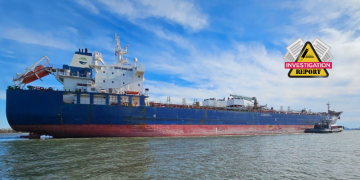Dr. Olivia Swift, Senior Programme Manager at Lloyd’s Register Foundation, has a background in anthropology with a focus on Filipino seafaring. Her deep connection to the maritime industry was shaped by the time she spent in the Philippines with seafaring families and her firsthand experience of life at sea. She credits this immersive experience as a pivotal career investment, providing invaluable insight and understanding that continue to inform her work.
Passionate about reducing fisher fatalities and improving seafarers’ working conditions, she upholds integrity, responsibility, and lifelong learning. She draws inspiration from various mentors, including public figures like Barack and Michelle Obama, and defines success as overcoming obstacles and empowering others. Her personal motto reflects a commitment to making meaningful contributions both professionally and in everyday life.
SAFETY4SEA: How did it come about that you joined shipping industry and your field of expertise specifically?
Olivia Swift: My maritime life started with a PhD in Anthropology about Filipino seafaring – although my familiarity with the industry has been lifelong, since my father held numerous roles across the industry.
S4S: What about your current job/ role most excites you and why?
O. Sw.: I’ve been fortunate to work at Lloyd’s Register Foundation since 2019, where I’m currently Head of Maritime Systems. It’s a fantastic team with which to work and I’ve learned a lot from my very competent colleagues. I love the freedom and agility that comes with being an independent, grant-giving charity, the variety of our work, and being able to enable change that ultimately saves lives. It doesn’t come much better than that.
S4S: When you think of the word successful who’s the first person who comes to mind and why?
O. Sw.: No one person! I’ve never thought of success in terms of wealth – I think it’s more about overcoming obstacles, or about enabling others. A teacher, for example, who throughout their career guides hundreds of children – surely that’s success.
S4S: Who is/was the most influential person/mentor to you & why?
O.Sw.: I think for most of us, parents and other close relatives are the ones who shape us most, but beyond that, I have a long list of people from whom I’ve learned about how I want to be. Most of them have been friends or colleagues, but there are a few public and fictitious figures I’ve found inspirational. Barack and Michelle Obama are perhaps obvious choices. Staying in the political realm, the character of Birgitte Nyborg in the Danish drama Borgen is also a favourite of mine – her integrity, compassion, and straight-forwardness give her a real sense of strength, even though that strength is really tested.
S4S: What is the best and what was the worst piece of advice you’ve ever been given and why?
O. Sw.: I actually don’t think I’ve been given all that much explicit advise – or maybe I’ve not asked for it, heard it, or remembered it. That probably says more about me than anything.
S4S: What is the most worthwhile career investment (in energy, time, money) you’ve ever made?
O.Sw.: I’m really grateful for having been able to spend a long time in the Philippines, with seafaring families, and for having been able to experience life at sea. I think I would really struggle to do my job without that insight and understanding, and more generally, I learned a lot from those years, including about myself.
S4S: If you could give a piece of advice to your 18-year-old-self one thing, what would it be and why? What piece of advice should you ignore?
O.Sw.: I can’t really remember what I was worried about at 18 and what I’d have found useful to hear at that age. More generally, there is so much advice offered in all aspects of our lives, and much of it is noise, which can be overwhelming. No one other than you really knows what your whole daily life is like across professional, domestic and other realms, so it’s worth remembering that no one else has that complete picture from which to advise or judge.
S4S: In the last five years, what new belief, behavior, or habit has most improved your business life?
O.Sw.: I suppose as we get older and more experienced, what we think, say and do has more weight. That’s been quite liberating, as I’ve realised that I’m more able to affect/lead change. And there’s a responsibility that comes with it too – but that’s more an impetus to think/speak/act well, rather than a burden.
S4S: What would you like to change in the current maritime landscape and your area of expertise specifically and why?
O.Sw.: I’d like to see the shockingly high numbers of fisher fatalities fall, and I’d like a reduction in the legal maximum contract length for seafarers. I know seafarers are often willing to work long contracts to maximise earnings when the next contract isn’t guaranteed, but there are other ways to increase job security. To me it’s crazy that in the 21st century, it’s acceptable for seafarers to be on a ship, with little/no shore-leave, for 11 months at a time (often far longer during COVID and some piracy hostage situations).
S4S: What is your personal motto?
O.Sw.: I have a few to draw on. One I’ve always liked is the motto of my first school: I am, I can, I ought, I will. To me, it’s about conducting oneself with integrity and recognising and acting on a responsibility to make my time on this earth count. That doesn’t need to be about any grand individual achievement – it’s much more about small, everyday encounters, and contributing to collective efforts.
The views presented are only those of the authors and do not necessarily reflect those of SAFETY4SEA and are for information sharing and discussion purposes only.





























































